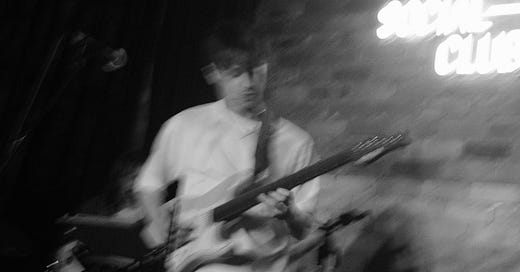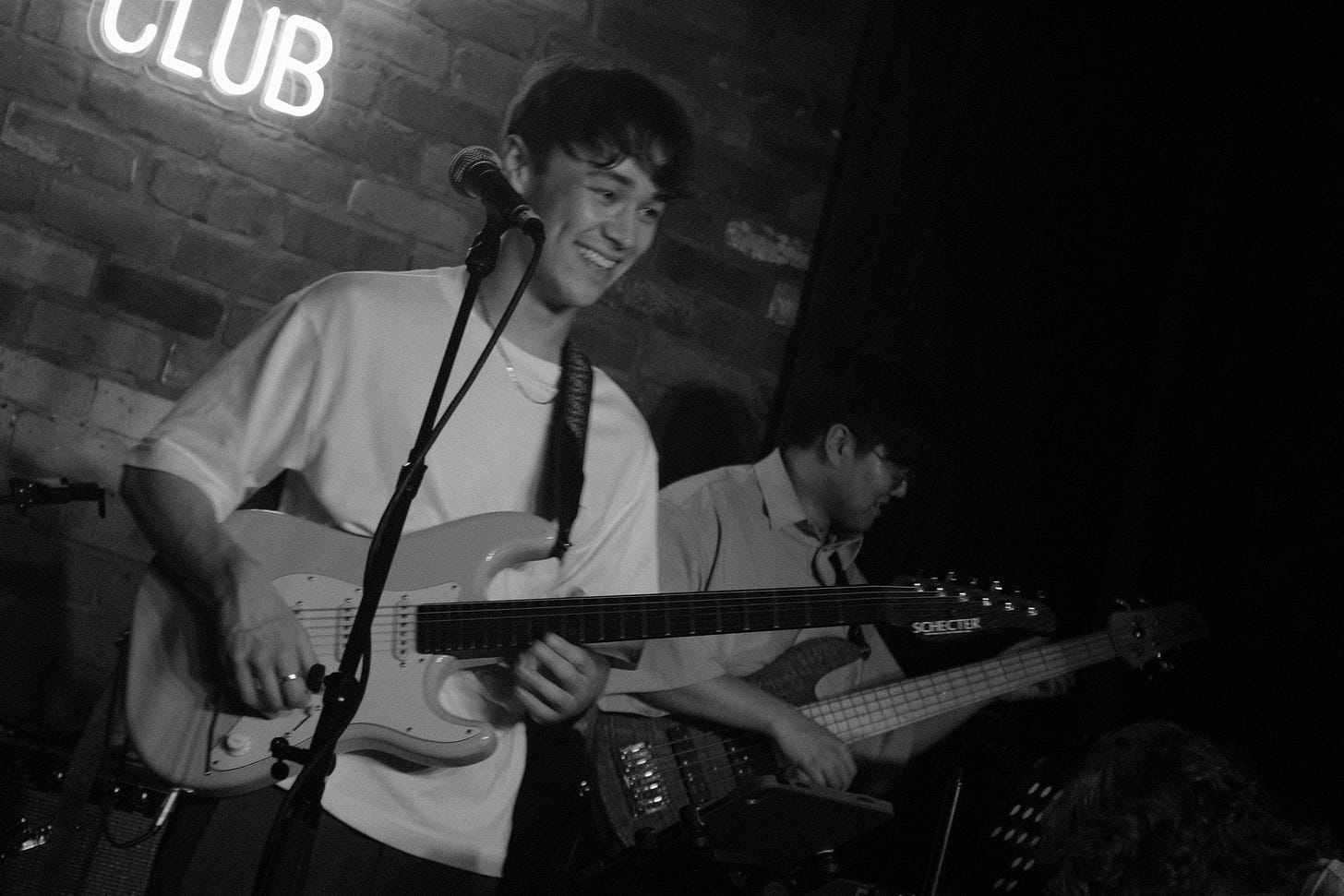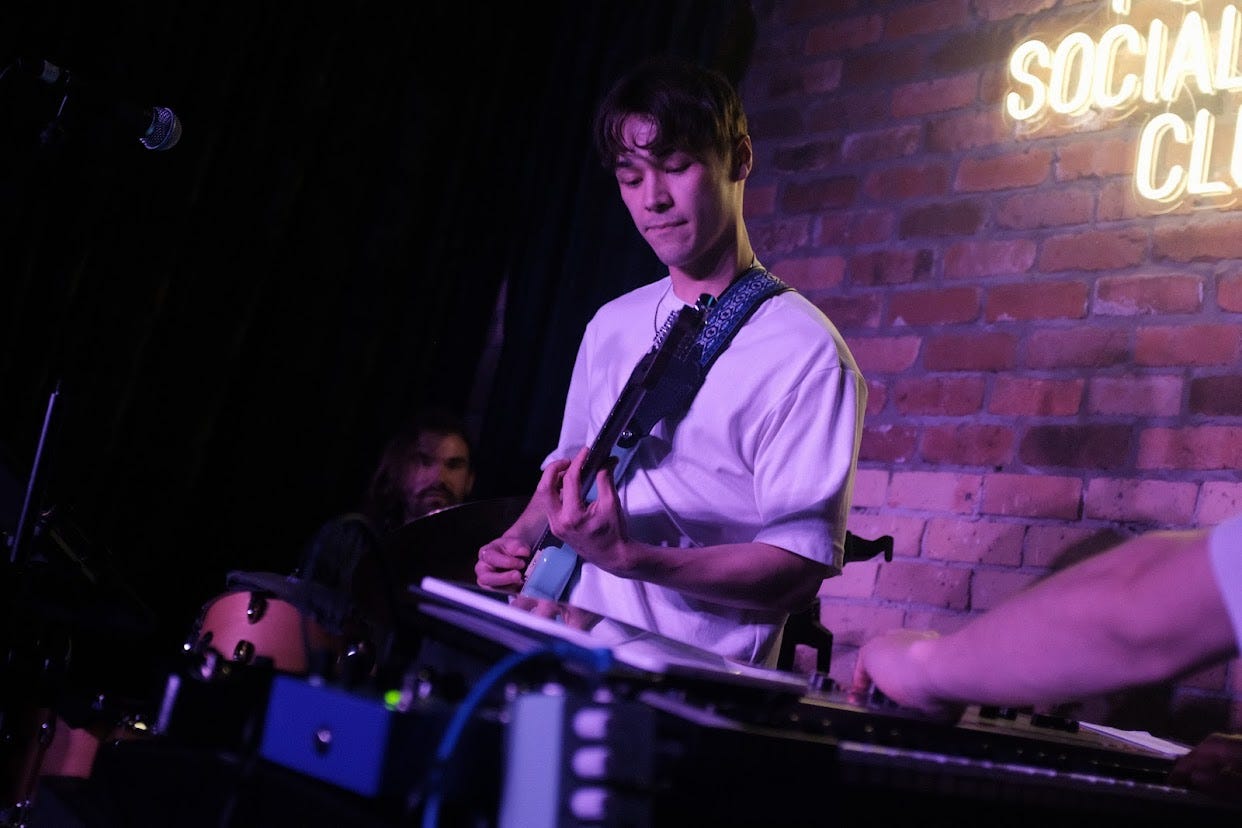Adrian Brown at Ponsonby Social Club - GIG REVIEW
Alex de Vries is blown away by Adrian Brown's technical skill at Ponsonby Social Club
The face of jazz in Auckland is young, fresh and doe-eyed, and Adrian Brown personifies this new wave of young artists dead set on proving that jazz is in fact not dead. Ponsonby Social Club heaves with the heat of excited bodies, crammed in like sardines to see perhaps the most talented bunch of young musicians on the scene. The drinks are flowing, the chatter is lively, and the sweat is dripping down my back. It may be cold as ice outside, but in here, it’s a boiler room, and the temperature only rises when our star arrives with his band, all smiles, and no sign of nervous energy. My friend and I settle in amongst the crowd, Red Bull in hand, to fully indulge in the Adrian Brown experience.
Brown and I go way back — we went to the same school. He was a confident and outgoing kid, and his love for music, and more specifically guitar, was evident all those years ago. Even back then I remember being impressed by his skill. He never let age get in his way — he wanted to be the best, and he put in the work to get there. Now all these years later, I see little Adrian Brown all grown up, and I’m kind of in awe of the man he’s become. Even more so, I am excited to see where all those years of hard work have taken him.
From the outset, it’s clear that we are witnessing consummate professionals at work. Accompanied by Andrew Isdale, Ben Frater, Elliott Park and the incredible Joe Kaptein, Brown wastes no time in presenting his technical masterclass. We’re witnessing a near perfect symbiosis — the flick of an eye is enough to signal a change of tack. As the pace quickens, so does my heart, and my eyes try to keep up with the repeated flashes of lightning striking ground on stage.
These kids know the language of jazz inside out. Every beat is struck with near perfect precision, like Brown’s perfect middle part, with no stray flyaways. The performance is slick and well rehearsed. Brown gives everyone their moment to shine, and each of the band members is just as keen to explore the full breadth of their technical prowess in front of us on stage. It feels rather generous to give us so much, but the audience is no doubt happy to oblige.
Kaptein on the keys clearly rises to the top on the night. An unstoppable force, it’s almost as if he was given the directive to run wild, and he took that literally. Isdale also has moments of greatness, particularly towards the start of the set. All the while my eye goes back to Brown, whose boyish charm is only complemented by his competence and knowledge of his instrument.
In saying that, though, there are moments where it all feels a little bit too self-indulgent. Perhaps that reflects the academic nature by which this crew approach jazz. There’s nothing wrong with that — technique is a type of spectacle that audiences love. I love it when an artist flexes their musical muscle on the masses, and your only reaction is to admire their talent. However these self-indulgent impulses are perhaps better paired with a warmer showmanship that holds the audience in safety. Brown is not overly verbose — he saves his charisma for the fretboard. At times I want him to tell me more about what inspired him to write these tunes, but he leaves us with a mystery that goes unsolved.
The audience is also weirdly sedated. I want them to bob their heads or sway, especially when met with danceable, soulful and funky songs. Instead they gawk as if conducting a study, carefully observing. One guy even has his phone tracking the bpm as the night goes on. In a certain way, this audience is here to witness a clinical performance, probably all jazz graduates themselves, with such an academic approach to music that they have lost the capacity to liberate their bodies from the shackles of capitalistic rigidity. Jazz is a liberating force, an awakening of the senses. Jazz demands playfulness not only from the performers on stage, but also from the audience, to access the very human impulse to dance.
Artistry arises when technique is matched by a flirtatious and fun energy, and the audience responds to that in kind. While the band are true masters of their instruments, undoubtedly better than most other musicians their age, it’s imperative that they continue to build on the personable aspect of being performers, in order to bring the right vibes.
Brown’s second song of the night, 춤 (Dance), which he teases as his next release, is brilliantly lively and enlightening. Perhaps this is the moment of the night where we see Brown at his most playful, as the subtle laughter shared between band members brings a human element into the mix of a set that could otherwise be so technical that it becomes inaccessible to the average punter like me. Nevertheless, for someone to be so young and so exceptionally talented, Brown has already done the hardest part in taking big swings towards being New Zealand’s next foremost jazz guitarist.
All these years later, seeing Adrian Brown take to the stage, beer in hand, I feel like this is the man I always knew he’d become. Surrounded by an incredible group of peers, Brown laid out a masterclass in jazz education, with original songs that matched the quality of the arrangements he presented. I leave the bar feeling inspired by what I’ve seen — I have witnessed the growth of an artist over a number of years, which other people in the room may never get to see themselves. With just a little bit more vulnerability, we could be witnessing the birth of a star. All that is to say that if Adrian Brown is the new face of local jazz, then the future of jazz is almost as bright as his perfect, yet cheeky, smile.
Verdict — a win is a win (big time).
Images supplied by @yu_lily_kid








great review, cheers mate!